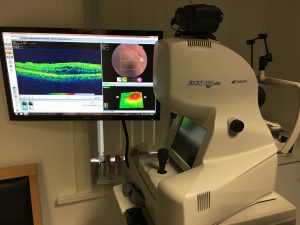The most detailed examination of the health of the eye
- We allocate extra time during your appointment, giving our optometrist time to analyse the information – and discuss the results with you in plain english.
- We have been offering OCT scans since 2011 (the first in the Bradford and Airedale area!) – giving our optometrists great experience interpreting the detail that it provides.
- This allows us to detect serious eye conditions from even the smallest signs much earlier.
- We securely store your scans and our technology allows us to compare your scans at each visit – providing peace of mind that your eye health is being monitored.
This hospital grade technology allows our optometrists to identify, diagnose, monitor and if needed, refer promptly for treatment with much more certainty. The local hospitals often refer patients to Airedale Opticians due to our expertise with using OCT technology
Why you should have a 3D OCT Scan?
- Having the Eye scan allows us to document the health of the eyes (a bit like a dental tooth x-ray) for future comparison.
- It allows us to detect eye conditions that would not be otherwise visible with traditional examination techniques.
- It allows us to directly compare scans year-on-year to spot subtle changes.
- It allows us to monitor known eye conditions in great detail.
If you are over age 25, or at risk of developing ocular disease, our Optometrists recommend an OCT exam as part of your annual eye exam.
Having regular OCT scans will enable our Optometrists to compare the images from previous years to detect any abnormalities or thickening of retinal layers.
If you have been diagnosed with an ocular disease, an OCT scan will also provide the information needed to monitor treatment.
When is an OCT Scan used?
OCT scans are used for diagnosis, management or treatment of a variety of ocular conditions:
- History of Macula Problems (central vision)
- Macula Degenration (AMD)
- Evaluation of macula
- Macular hole or pseudohole
- Vitreomacular traction
- Glaucoma Diagnosis and Monitoring
- Drusen
- Retinal assessment
- Retinal Detachments
- Retinal pigment epithelium detachment
- Epiretinal membrane
- Retinoschisis
- Central serous chorioretinopathy
- Optic disc edema
- Optic nerve head drusen
- Ganglion cell complex
- Neovascularization










